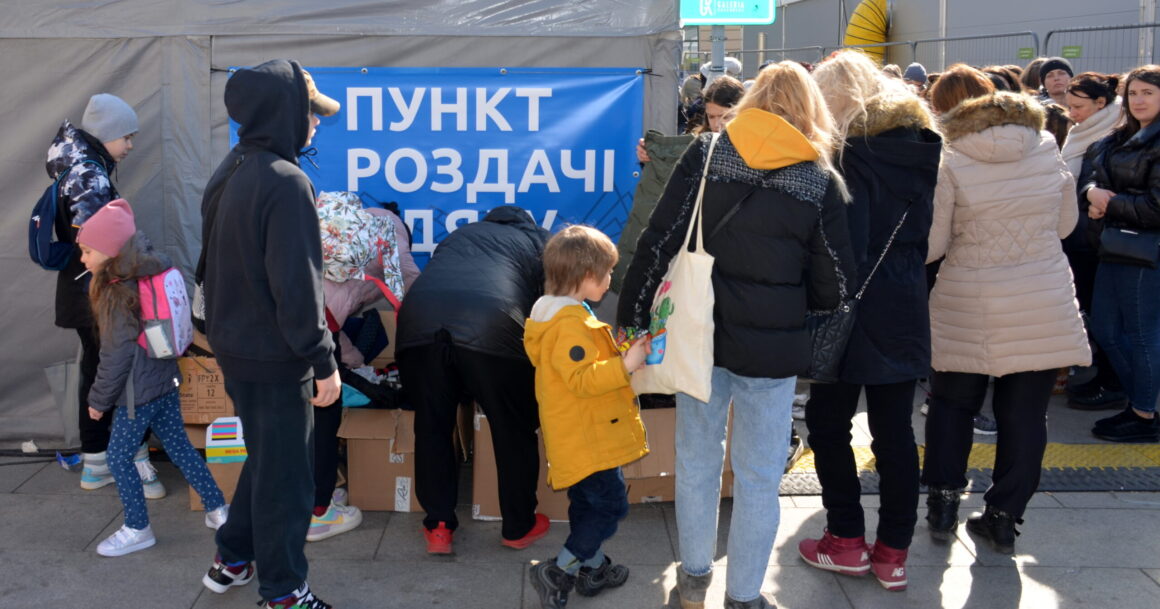

By R Banks
More than 3.7 million Ukrainian civilians have fled the war-torn country since the Russian invasion began, according to the United Nations. Nearly 6.5 million are internally displaced, placing great pressure on cities in the east, notably but not exclusively Lviv. Even here they are not safe.
In total more than 10 million people—a quarter of Ukraine’s population—have had to flee their home, seeking refuge from Russian missiles and tanks.
Exceptionally this refugee crisis has affected women and children most: making up around 90% of the displaced people. According to Unicef, 4.3 million out of a total 7.5 million Ukrainian children are far from their homes, their fathers, their friends. The psychological trauma will doubtless affect them for years.
Mothers and women too are particularly vulnerable to sexual assault, sex traffickers and violence. They need security in the short term, a safe home, a reliable source of income and protection.
No wonder there has been a mass outpouring of solidarity and sympathy from the world’s working class, keen to open their homes to Ukrainian refugees. But this generosity has not been matched by the leaders of the world’s richest nations.
British response
While Poland has taken in 2.2 million and Romania, Moldova and Hungary—none of which are brimming with resources—hundreds of thousands, Britain was slow off the mark. A week into the conflict when the scale of the refugee crisis became apparent, the European Union announced that Ukrainians would need neither a visa nor a passport. The Tory government, however, refused to lift this requirement.
It took more than two weeks for the Homes For Ukraine scheme to be announced. In line with the Tory ideology, the scheme is not a guarantee of support. All refugees must have a ‘sponsor’, a UK citizen willing and able to take in and support one or several refugees, for which they will receive the government’s condescendingly named ‘thank you payment’, a miserly £350 a month.
If refugees don’t have a sponsor, they can’t come. Despite the difficult terms of the government’s scheme, however, there has been a huge public response with more than 60,000 refugees having already been admitted under the scheme, though this number is small considering 100,000 offers of support that came in on the first day the scheme was launched.
More needs to be done. The nature of the scheme flows from xenophobic propaganda that there is no more room for migrants. This is a lie – it is not a question of limited space, but rather limited political will in terms of the allocation of resources.
Britain’s housing crisis has never been the fault of immigrants or refugees and, in the longer term, must be solved through a mass council house building programme. In the short term—as the pandemic demonstrated —hotels and public buildings can be requisitioned. The government’s offer to councils of £10,050 per refugees comes nowhere near funding this housing crisis.
Systemic racism
Despite the many inadequacies of the UK government’s scheme, its effects in terms of the relatively large number of refugees already allowed in under it cannot be denied. Despite years of anti-migrant and anti-refugee rhetoric from the government and right-wing press, large swathes of the public have been willing to take them into their own homes.
The treatment of these refugees compared to those of other wars has exposed the systemic racism at the heart of Britain’s callous immigration policies. For example, the similarly sized Syrian crisis has only seen 11,422 refugees settled in the UK in eight years.
Even now Home Secretary Priti Patel’s Nationality and Borders Bill, currently being debated by parliament, would criminalise refugees arriving in the country outside of a legal scheme, with penalties of up to four years imprisonment.
One of the key factors in the disproportionate—though welcome—response to this crisis appears to be that these predominantly white refugees are ‘Europeans’ and supposedly more worthy of sympathy and assistance than those fleeing war in Syria or Yemen.
The swift implementation of the policy has also highlighted the systemic racism in the treatment of millions of black and brown refugees fleeing wars of a western Imperialist aggression (Iraq, Afghanistan, Syria, Libya, etc.)
Even when Britain was shamed into admitting those Afghans who had supported the West’s occupation, when it suddenly abandoned them in August 2021, the response was riddled with racism. Up to 150,000 applied for visas, fearing Taliban reprisals; just 5% were granted visas, according to a Foreign Office whistleblower.
On top of this there have been numerous accounts of racism and discrimination on the border of Ukraine, with African, Asian and Arab students and workers being beaten by border guards and forced to the back of the line or off the trains, while white migrants are let into neighbouring countries with little trouble.
We must demand that visa requirements for all refugees are dropped and that the state take responsibility for housing and supporting refugees, rather than leaving this to individuals. And not just refugees, but also so-called ‘economic migrants’ seeking refuge from the poverty the ‘Great Powers’ inflict on the majority of the world’s countries.
Scrap the Nationality and Borders Bill and dismantle the ‘hostile environment’. Open the borders and let in all migrants and refugees who want to come here, regardless of their country of origin.